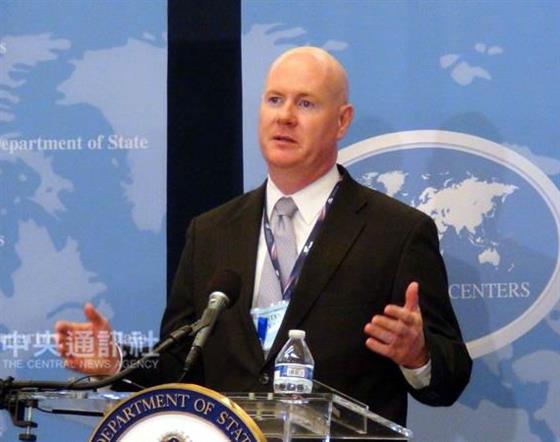
2016年7月20日,美国共和党党纲委员会小组联合主席叶望辉表示,党纲纳入对台六项保证,是共和党与民主党历年党纲中,美国确保对台友谊所使用最强烈的语言。
曾任前美国副总统钱尼亚洲顾问的叶望辉(Stephen Yates)是共和党2016年党纲委员会小组联合主席,党纲中首度列入对台六项保证,并强调所有台湾的未来,都应透过对话和平来解决,并能被台湾人民接受。
叶望辉在共和党全国代表大会期间于外国记者中心指出,相信这是共和党党纲中,相较于历年,甚至是共和党与民主党的党纲中,美国确保对台友谊所使用最强烈的语言。
他说,即使是2016年的此刻,处理两岸的六项保证仍然有其影响。
他强调,美国希望友邦了解,当他们处理困难的协商以及与邻国的关系时,无论是以色列、或台湾面对中国大陆,党纲文字是为清楚说明,美国支持友邦与民主,不会强迫友邦进行他们认为违背其利益的协商。
叶望辉说,支持六项保证是国会参众两院的决议,如今也纳入共和党党纲,希望这被视为共和党支持长期友邦的姿态,也是纳入党纲的原因。
他指出,党纲委员会起草党纲期间,与川普幕僚充分沟通,也未感到对方的压力,竞选阵营充分支持。
2016年7月18日,2400名代表参加的美国共和党全国代表大会一致通过了共和党新党章,新党纲指出,反对两岸任何一方片面改变台海现状,关于台湾未来的所有问题,必须透过对话和平解决,并且需要台湾人民同意;如果中国大陆违反这些原则,“美国基于台湾关系法,将帮助台湾自卫。”
党纲并指出,共和党赞扬台北新政府,在继续台海两岸建设性关系上的努力,并且呼吁中国大陆相回应(to reciprocate)。
共和党新版党纲赞扬,台湾新政府致力持续推动建设性的两岸关系,并呼吁中国大陆相应展现善意。党纲还指出,台湾是美国的忠实友人,美方坚定支持台湾取得各项自由贸易协议的地位,适时出售防御性武器,包括建造柴电潜舰科技、全面参与世界卫生组织(WHO)、国际民航组织(ICAO)及其它多边组织。
共和党也赞扬台湾人民,与台湾分享民主、人权、自由市场经济的价值观和法治;台美双方的关系将持续基于台湾关系法,以及里根政府于1982年给予台湾的六项保证。“六项保证”内容如下:
1. 美国不会设定停止对台军售的日期;
2. 美国不会修改“台湾关系法”的相关规定;
3. 美国不会在决定对台军售前和中国谘商;
4. 美国不会在台湾与中国间担任调人;
5. 关于台湾主权,美国不会改变自身立场,这是个须由中国人自己解决的问题,且美国不会迫使台湾与中国谈判;
6. 美国不会正式承认中国对台湾的主权。
2016年7月7日,美国联邦参议院院会一致通过“台湾关系法”与“六项保证”是美台关系基石的“共同决议案”。至此,联邦参、众两院都将“六项保证”诉诸文字。
这项共同决议案(Concurrent Resolution)不具法律约束力,无须美国总统签名生效,但代表国会对某件事物的态度与立场,而参、众两院院会都将「台湾关系法」与「六项保证」是美台关系基石诉诸文字,显示美国国会内不分党派对美台关系的坚定支持。
参院今天是以俗称“热线程序”(Hotlines Process)的方式,一致通过这项共同决议案。
热线程序是多数党领袖与少数党领袖就某项法案有所沟通后,多数党领袖的办公室会打电话到每位参议员办公室,在“电话热线”上告知是哪一法案及它的内容。
一般来说,这类不透过投票方式的表决程序,多是处理两党有极高共识的法案才可行,因为只要有一位参议员表达反对,热线程序就无法完成,立法进程会变成“等待中”。
《美国共和党党章》的原文摘录:
We salute the people of Taiwan, with whom we share the values of democracy, human rights, a free market economy, and the rule of law. Our rela?tions will continue to be based upon the provisions of the Taiwan Relations Act, and we affirm the Six Assurances given to Taiwan in 1982 by President Reagan. We oppose any unilateral steps by either side to alter the status quo in the Taiwan Straits on the principle that all issues regarding the island’s fu?ture must be resolved peacefully, through dialogue, and be agreeable to the people of Taiwan. If China were to violate those principles, the United States, in accord with the Taiwan Relations Act, will help Taiwan defend itself. We praise efforts by the new government in Taipei to continue constructive re?lations across the Taiwan Strait and call on China to reciprocate. As a loyal friend of America, Taiwan has merited our strong support, including free trade agreement status, the timely sale of defensive arms including technology to build diesel submarines, and full participation in the World Health Organiza?tion, International Civil Aviation Organization, and other multilateral institutions.
China’s behavior has negated the optimistic language of our last platform concerning our future relations with China. The liberalizing policies of recent decades have been abruptly reversed, dissent brutally crushed, religious persecution heightened, the internet crippled, a barbaric population control two-child policy of forced abortions and forced sterilizations continued, and the cult of Mao revived. Critics of the regime have been kidnapped by its agents in foreign countries. To distract the populace from its increasing economic problems and, more importantly, to expand its military might, the government asserts a preposterous claim to the entire South China Sea and continues to dredge ports and create landing fields in contested waters where none have existed before, ever nearer to U.S. territories and our allies, while building a navy far out of proportion to defensive purposes. The complacency of the Obama regime has emboldened the Chinese government and military to issue threats of intimidation throughout the South China Sea, not to mention parading their new missile, “the Guam Killer,” down the main streets of Beijing, a direct shot at Guam as America’s first line of defense. Meanwhile, cultural genocide continues in Tibet and Xinjiang, the promised autonomy of Hong Kong is eroded, the currency is manipulated, our technology is stolen, and intellectual property and copyrights are mocked in an economy based on piracy. In business terms, this is not competition; it is a hostile takeover. For any American company to abet those offenses, especially governmental censorship and tracking of dissenters, is a disgrace.
The return to Maoism by China’s current rulers is not reason to disengage with the Chinese people or their institutions. We welcome students, tourists, and investors, who can see for themselves our vibrant American democracy and how real democracy works. We caution, however, against academic or cultural operations under the control of the Chinese government and call upon American colleges to dissociate themselves from this increasing threat to academic freedom and honest research.

